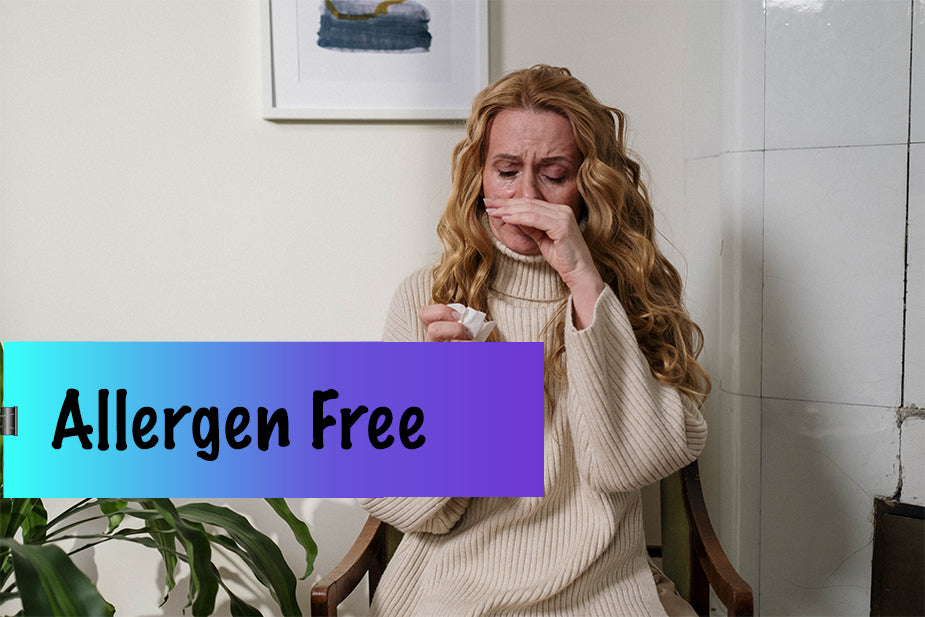BUICED is Allergen Free. What are the top 8 Allergens?
 For this reason, many people are choosing to go allergen-free by eliminating specific foods or food groups from their diet. In this blog post, we will discuss the benefits of going allergen-free and what it means to be allergen-free.
For this reason, many people are choosing to go allergen-free by eliminating specific foods or food groups from their diet. In this blog post, we will discuss the benefits of going allergen-free and what it means to be allergen-free.
The eight most common food allergens, also known as the "Big 8," are:
1. Milk: This includes cow's milk, but also includes milk from other animals, such as goats and sheep. Milk allergy is one of the most common food allergies in infants and young children.
2. Eggs: This refers to both the egg whites and yolks. Egg allergy is also common in children, but many outgrow it by the age of five.
3. Fish: This includes all fish species, such as salmon, tuna, and cod. Fish allergy can be severe and life-threatening, and is often lifelong.
4. Shellfish: This includes all crustaceans, such as shrimp, crab, and lobster, as well as mollusks, such as clams, oysters, and squid. Shellfish allergy is also often lifelong and can be severe.
5. Tree nuts: This includes all nuts that grow on trees, such as almonds, walnuts, and cashews. Tree nut allergy is one of the most common food allergies in adults and can be severe and lifelong.
6. Peanuts: Peanuts are technically a legume, but are classified as a separate allergen due to their high likelihood of causing severe allergic reactions.
7. Soy: Soy allergy is common in infants and young children, but many outgrow it. Soy is often used as a filler or emulsifier in processed foods, making it difficult for those with soy allergy to avoid.
8. Wheat: This includes all forms of wheat, such as bread, pasta, and cereal. Wheat allergy is less common than some of the other allergens, but is still a significant concern for many individuals.
It's important to note that while these eight allergens are the most common, people can be allergic to any food, and any food has the potential to cause an allergic reaction. It's important for individuals with food allergies to read ingredient labels carefully and to always communicate their allergies to others, especially when eating out or in social situations.
What is an Allergen-Free Diet?
An allergen-free diet is a dietary approach that involves eliminating specific foods or food groups that can cause an allergic reaction in some individuals. Common food allergens include nuts, dairy, eggs, soy, wheat, and shellfish. By avoiding these foods, individuals with allergies can prevent allergic reactions and promote better overall health and wellbeing.
Benefits of an Allergen-Free Diet
- Reduced Risk of Allergic Reactions
The primary benefit of an allergen-free diet is a reduced risk of allergic reactions. For individuals with food allergies, exposure to certain foods can cause symptoms ranging from mild hives to life-threatening anaphylaxis. By avoiding allergenic foods, individuals can reduce their risk of allergic reactions and live a safer and healthier life.
- Improved Digestive Health
For individuals with food intolerances, avoiding allergenic foods can improve digestive health. Intolerances occur when the body has difficulty digesting specific foods, leading to symptoms such as bloating, gas, and diarrhea. By avoiding allergenic foods, individuals can reduce symptoms and promote better digestive health.
- Better Nutritional Value
Eliminating allergenic foods from the diet can encourage individuals to choose more nutrient-dense and whole foods. By replacing allergenic foods with fruits, vegetables, and other nutrient-rich foods, individuals can ensure that they are getting the vitamins and minerals they need for optimal health and wellbeing.
- Improved Mental Health
Some studies have shown a link between food allergies and mental health issues such as anxiety and depression. By avoiding allergenic foods, individuals with food allergies can reduce the risk of mental health issues and promote better overall wellbeing.
- Support for Ethical and Sustainable Farming Practices
Going allergen-free often means choosing foods that are grown and produced in ways that are ethical and sustainable. By supporting local and organic farming practices, individuals can promote a healthier food system that is better for both people and the planet.
In conclusion, going allergen-free can have numerous benefits for individuals with food allergies and intolerances. By eliminating allergenic foods from the diet, individuals can reduce their risk of allergic reactions, improve digestive health, promote better nutritional value, support mental health, and encourage ethical and sustainable farming practices. As always, it's essential to speak with a healthcare professional or registered dietitian before making any significant dietary changes or lifestyle choices.
